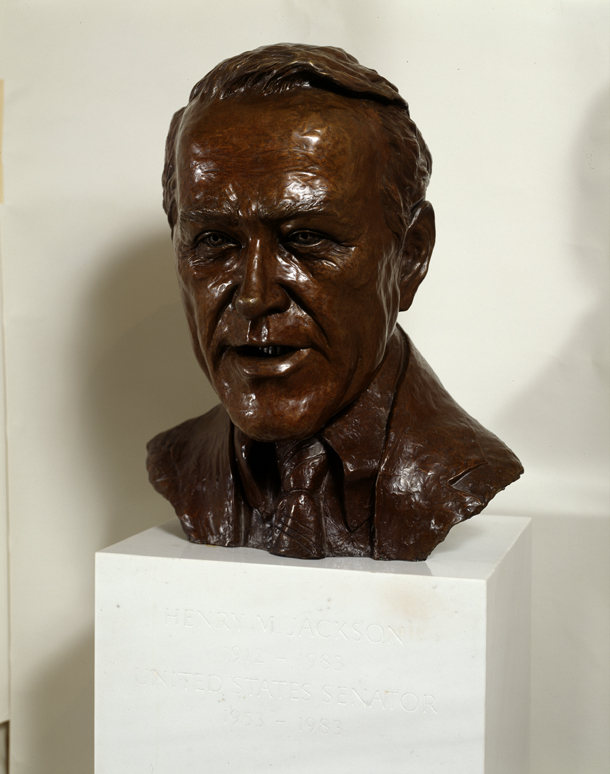
| Title | Henry Jackson |
| Artist/Maker | Wendy M. Ross ( 1946 - Present ) |
| Date | 1985 |
| Medium | Bronze |
| Dimensions | h. 31.5 x w. 24 x d. 26.5 in. (h. 80 x w. 61 x d. 67.3 cm) |
| Credit Line | U.S. Senate Collection |
| Accession Number | 24.00008.000 |
This bronze portrait bust of Henry Jackson was donated to the U.S. Senate in 1987 by Helen Hardin Jackson, the senator’s widow, and the Henry M. Jackson Foundation. Several years earlier the foundation had commissioned a bust of Jackson from artist Wendy Ross for display at the Henry M. Jackson School of International Studies in Seattle. In an April 10, 1987, letter to Senator Wendell Ford, chairman of the Senate Committee on Rules and Administration, Helen Jackson wrote, “A second cast of the bust was also commissioned with the hope that it might be placed as a memorial to Scoop somewhere in the Capitol or in one of the Senate office buildings where he spent so much of his life and career in public service.” The bronze bust was cast by Wegner Metal Arts Foundry in Fredericksburg, Virginia, and formally accepted and placed in an alcove in the Russell Senate Office Building during a ceremony on November 19, 1987.
An internationally recognized artist, Wendy M. Ross received her master’s degree from the Rhode Island School of Design in 1973. Her public portrait commissions include a monumental bronze bust of Justice William O. Douglas for the Supreme Court of the United States, and a second version at the C&O Canal National Historical Park in Washington, D.C., and a full-length statue of Congressman Philip Burton overlooking the Golden Gate Bridge in San Francisco. Her larger-than-life-size seated figure of George Mason for the George Mason Memorial in Washington, D.C., was unveiled in 2002. Ross’s abstract steel works are located in many public and private collections. In 2002 she completed a horizontal 100-foot welded steel sculpture facing Boston Harbor on the Grand Staircase of the Boston World Trade Center.
Henry Martin Jackson–-popularly known by the nickname "Scoop"–-was born in Everett, Washington. Jackson practiced law in his hometown and became prosecuting attorney of Snohomish County in 1938. Two years later he was elected to the U.S. House of Representatives as a Democrat, where he served for the next 12 years, briefly chairing the Committee on Indian Affairs. Jackson won election to the U.S. Senate in 1952.
Throughout his long and distinguished Senate career, Jackson focused his efforts on two issues: energy and the environment, and national security. He served as chairman of the Committee on Interior and Insular Affairs and its successor, the Committee on Energy and Natural Resources; in this capacity he was uniquely positioned to address the natural resource concerns of his Washington state constituents. He was instrumental in passing conservation and energy legislation throughout the 1960s and 1970s, and drafted the landmark National Environmental Policy Act of 1969. Also an advocate for strong national defense, particularly with regard to the Soviet Union, Jackson was a member of both the Joint Committee on Atomic Energy and the Armed Services Committee, and gained a reputation as an expert on nuclear weapons and defense issues.
Well respected by his colleagues in the Senate, Jackson was considered a front-runner for the Democratic vice-presidential nomination in 1960, but John F. Kennedy offered the nomination to Lyndon Johnson instead. In announcing the news to the press, Jackson remarked, "No one should enter politics unless he is a good sport...I will do whatever Senators Kennedy and Johnson want me to do. I will do everything a good sport should do." [1] That year he served as chairman of the Democratic National Committee. He later ran unsuccessfully for the Democratic presidential nomination in 1972 and 1976. Senator Jackson died in office on September 1, 1983, ending a congressional career that spanned more than four decades.
1. William W. Prochnau and Richard W. Larsen, A Certain Democrat: Senator Henry M. Jackson (Englewood Cliffs, NJ: Prentice-Hall, 1972), 196.